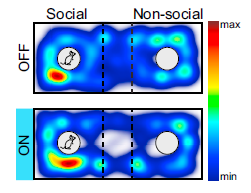The Neuroscience of Loneliness
In a society that has a hyperconnected that we live, loneliness is an epidemic.
Loneliness is an epidemic. We are going through a period of profound social change, and the internet and other new social technologies are a big driver of this epidemic, allowing us to stay in contact with others without actually having to connect with them.
Humans, like or dislike, are social mammals. We need to interact with each other, and as a society, we tend to organize ourselves in society. Loneliness - another term for social isolation - is not new. The author has written about it for centuries, but this is more than a source of inspiration for art; This is a biological mechanism that encourages people to find the social interactions they lack and need. The brain will encourage lonely individuals to find someone to interact with, because, again, we are social mammals. We need companies because our prehistoric ancestors desperately need companies to survive; other human presence ensures protection and support both for themselves and for their descendants. Our brains still think we need to be surrounded by others to survive and thrive.
Of course, loneliness is also a natural feeling that everyone experiences at some point in their lives. But the chronic state of social isolation is associated with depression, anxiety, and PTSD (Post-Traumatic Stress Disorder). This is a real threat to group members most vulnerable to social isolation, which is often overlooked in terms of mental health.
Google "lonely epidemic" and you will find that many people have asked questions like: Can someone die of loneliness? This may seem above, but the question has been raised, and loneliness actually begins to be regarded as a public health problem. But what is the physiological mechanism of feeling lonely? And can loneliness really kill us?
Research has been published to explain some of these issues. Researchers have found that social isolation affects the activation of dopaminergic and serotonergic neurons, which are key to our emotional well-being.
Matthews and collaborators found that dopaminergic neurons in the brain region called the dorsal raphe nucleus are activated in response to acute social isolation and trigger the motivation to seek and re-engage in social interaction.
They studied mice that were collected together or isolated, and tracked their reactions when they were introduced to new mice. Rats that have been isolated to that point indicate very high activity in the region of the brain, which motivates them to interact with new rats inside the cage. On the other hand, mice that have interacted with other mice (ie, mice residing together) show a lack of interest in the new kid in the block.
Test three chambers. The previously isolated mouse is placed in the center and allowed to roam the enclosure. The color code shows where the mouse spends more time, where maximum red and dark blue are minimum. When neurons are "on", the mouse spends more time interacting with the waiting mouse in the social section. Source: Dorsal Raphe Dopamine Neuron Is A Social Isolation Experience. Matthews GA et al., Cell, 2016.
To measure their social skills, they use the well-known protocol to study social interaction: a three-room test. In this protocol, the mouse is placed inside the enclosure with three different sections. One is the so-called "social part," in which another mouse is in place.
We hope that the studied rats (starting from the center of the cage) will spend more time exploring the social part and interacting with new mice, rather than isolating themselves in the non-social parts of the enclosure. Because, like us, rats are social mammals. With the power of optogenetics (links are external), the researchers play with photoactivation of dopaminergic neurons at the dorsal raphe nucleus. They are able to turn the neurons "on and off" at will and learn the changes. The researchers found that when these neurons "flared up," the mice spent more time in the social section of the cage, showing an increased motivation for hospitality.
Interestingly, they also observed hostile behavior when dopaminergic neurons in the dorsal raphe nucleus were activated, but the studied mice lacked the possibility of social interaction (ie, new mice in the social part were absent). In another experiment, rats avoided the part of the cage where it received mild stimulation, after learning to connect light with "feelings of loneliness." And in the absence of other mice, there will be no relief for his loneliness.
All of these results suggest that neuronal connections are strengthened after social isolation, which makes individuals look for social interactions that they lack. The researchers concluded that the activation of dopaminergic neurons in the dorsal raphe core is only necessary for isolated individuals, since they are the ones that most need social interaction.
They compare companies' desires in socially isolated individuals to starvation conditions that fuel food search. Because different neural circuits engage in yummy food consumption, or because we are hungry, they hypothesize that the same situation applies to social interactions, and speculates that different neural networks may play a role when subjects want social interaction because it is beneficial (yummy), or because they feel lonely (hungry).
Sargin and collaborators came to the same conclusion after seeing serotonergic neurons rather than dopaminergic neurons in the dorsal raphe nucleus in response to social isolation. They identified SK channels responsible for changes in serotonergic neurons after chronic social isolation. So when they block these channels, they can treat behaviors such as anxiety and depression in isolated mice (eg, eating disorders and decreased mobility).
Loneliness, as we all feel, is controlled by the brain. Although loneliness is considered a negative feeling, science shows that it is actually something we need to address situations that can harm us. Just like feeling physical pain, this is how your body tells you that something is wrong. So, loneliness can not kill us, but if not reduced, it can trigger anxiety, stress, and depression, which are known to push people into unfavorable outcomes.
Next time you feel lonely, think about the core of your dorsal raphe. The neurons are just trying to help you; listen to them. Find your social interaction, and give the neurons a break.
This post was originally published in NeuWrite San Diego
- Reference
The Evolution of Anxiety and Social Exclusion. Buss, D.M. J. Soc. Clinic. Psychol. 9, 196-201. 1990.
Old Age and Loneliness Renee P. Meyer, MD and Dean Schuyler, M. Prim Care Companion CNS Disord. 2011; 13 (2): e1 - e2.
Dorsal Raphe Dopamine Neurons Is A Social Isolation Experience, Gillian A. Matthews, Edward H. Nieh, Caitlin M. Vander Weele, Sarah A. Halbert, V. Pradhan, Ariella S. Josafat, Gordon F. Glober, Ehsan M. Izadmehr, Rain E. Thomas, Gabrielle D. Lacy, Craig P. Wildes, Mark A. Ungless, Kay M. Tye. Cell, Volume 164, Issue 4, 11 February 2016, Page 617-631, ISSN 0092-8674, http://dx.doi.org/10.1016/j.cell.2015.12.040.
Chronic social isolation reduces the activity of 5-HT neurons through the regulated potassium potassium of SK3. Sargin D, Oliver DK, Lambe EK. 2016 Nov. 22nd.


Very interesting read, its mad how everyone is talking to each other on tech but not talking to each other in person, there has to be some kind of loss there as you say.
I just continue, I'm glad this can be useful :)
What a beautiful read. Thanks for sharing. Following you to stay tuned for more..😊
Thank you, and vice versa, happy to share :)
Congratulations @cencerement, you have decided to take the next big step with your first post! The Steem Network Team wishes you a great time among this awesome community.
The proven road to boost your personal success in this amazing Steem Network
Do you already know that awesome content will get great profits by following these simple steps that have been worked out by experts?